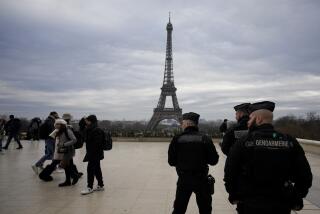France Bombing Suspect Dies in Shootout : Crime: Police say death of Algerian probably won’t end attacks linked to North African rebels.
PARIS — A young Algerian man wanted in connection with a series of recent bombings in France was shot and killed by police late Friday at a bus stop near Lyon, ending a massive two-day manhunt that has fascinated the country.
The killing of Khaled Kelkal, 24, is likely to provide a temporary public relations boost for the French police, who have been frustrated by their inability to find the people responsible for bombings in Paris and Lyon that have killed seven people and injured more than 130 since July 15.
But, officials here acknowledge, the suspect’s death does not solve those crimes and probably will not end the bombing campaign.
Kelkal, who lived in a Lyon suburb and served two years in prison for burglaries, became a suspect when his fingerprints were found on a piece of adhesive tape attached to an unexploded bomb on the high-speed train line between Lyon and Paris on Aug. 16. That bomb--a canister of powder explosive and nails--was similar to ones that have exploded elsewhere and are considered a signature of Algerian guerrillas.
Kelkal had not been directly implicated in any of the other five bombings or attempted bombings, including one that killed seven in central Paris in July. But police considered him part of the network of Muslim extremists from Algeria they believe to be behind the attacks. Those guerrillas, who are battling to overthrow Algeria’s military-backed regime, are angry with the French for supporting the government in that North African nation.
More than 750 police officers, using helicopters and tracking dogs, had been searching for Kelkal since Wednesday, when a mushroom hunter stumbled upon a grenade, leading police to the man’s forest hide-out near Lyon in central France. Police raided that hide-out, wounding an accomplice and arresting two others, but Kelkal escaped.
The authorities said they found Islamic literature, a map of the Lyon area and addresses of possible safehouses. Kelkal’s fingerprints were on the map. They also seized two shotguns, a submachine gun and an alarm clock fitted with electrical wires that they said could have been used as a timing device for a bomb.
On Friday night, as police began to scale back their manhunt, Kelkal was seen at a bus stop about five miles outside of Lyon. As commandos approached, Kelkal fired on officers and was killed, police said.
Investigators believe that Kelkal was just one of several, perhaps even dozens, of young Islamic radicals living in France who may be involved in planting the bombs in the country’s worst spate of terrorism in more than a decade.
*
Kelkal apparently was not among the three young men, also described by police as North Africans, who left the bomb--a canister filled with liquid explosive--on the subway car in the Latin Quarter of Paris that killed seven people and injured dozens on July 25. And he was not linked directly to the bombs that exploded in a trash can near the Arc de Triomphe and beneath a stall at an outdoor Paris market. Police found fingerprints on one unexploded device in a Paris toilet, but none matched those of Kelkal.
However, police have said Kelkal, being from the area, might have been involved in a car bombing outside a Jewish school near Lyon.
Police believe that the bombs are also linked to the assassination, by two gunmen, of an elderly moderate Islamic religious leader in Paris on July 11. No one has been arrested in that case.
More to Read
Sign up for Essential California
The most important California stories and recommendations in your inbox every morning.
You may occasionally receive promotional content from the Los Angeles Times.









